- Home
- Cynthia Breeding
A Rake's Redemption
A Rake's Redemption Read online
Table of Contents
Chapter One
Chapter Two
Chapter Three
Chapter Four
Chapter Five
Chapter Six
Chapter Seven
Chapter Eight
Chapter Nine
Chapter Ten
Chapter Eleven
Chapter Twelve
Chapter Thirteen
Chapter Fourteen
Chapter Fifteen
Chapter Sixteen
Chapter Seventeen
Chapter Eighteen
Chapter Nineteen
Chapter Twenty
Chapter Twenty-One
Chapter Twenty-Two
Chapter Twenty-Three
Chapter Twenty-Four
Chapter Twenty-Five
Chapter Twenty-Six
Epilogue
About the Author
Discover more Amara titles… How to Train Your Baron
Six Weeks with a Lord
How to Fall for the Wrong Man
When a Lady Desires a Wicked Lord
This book is a work of fiction. Names, characters, places, and incidents are the product of the author’s imagination or are used fictitiously. Any resemblance to actual events, locales, or persons, living or dead, is coincidental.
Copyright © 2018 by Cynthia Breeding. All rights reserved, including the right to reproduce, distribute, or transmit in any form or by any means. For information regarding subsidiary rights, please contact the Publisher.
Entangled Publishing, LLC
2614 South Timberline Road
Suite 105, PMB 159
Fort Collins, CO 80525
[email protected]
Amara is an imprint of Entangled Publishing, LLC.
Edited by Alethea Spiridon
Cover design by Yellow Prelude Design, LLC
Cover photography from Shutterstock, Novel Expressions, Deposit Photos
ISBN 978-1-64063-246-2
Manufactured in the United States of America
First Edition July 2018
Chapter One
A pounding on Countess Benton’s bedroom door brought Alexander Ashley swiftly to a sitting position. He grabbed his shirt as he leaped out of bed, pulling up his breeches at the same time. He never took off his breeches or his boots in these circumstances precisely for this reason.
“Let me in!” an angry male voice bellowed.
Alex made for the window, which he’d left open, lithely springing over the sill to drop to the cupola one story below.
The countess followed him to the window, not bothering with a robe. “When will I see you again?”
“Let me in!” her husband shouted again.
“You had better do as he asks before he breaks the door down,” Alex answered.
She turned toward the noise. “Just a minute.”
By the time she poked her head back out the window, Alex had already reached the ground. He grinned and gave her a mock salute.
“But when…”
Alex widened his grin and shook his head. He never encouraged women by returning. Then he moved into the shadows as he heard the door splinter.
As he made his way down the darkened street, he allowed himself a moment of self-congratulation. Another woman had been quite thoroughly pleasured. Not just any woman, either, but Miranda Locke, wife of his damn brother’s best friend.
Alex took pride in making sure any woman he took to bed was completely satisfied when he was through. That determination had taken on new meaning since his almost betrothed had jilted him for his brother. Over the past eighteen months, he’d made a quest of reading the subtle signs indicating what a female wanted. It wasn’t so different from reading the faces of men at the faro tables and gaming dens he frequented. But these days he wanted a woman more than satiated. He wanted to take her to heights she couldn’t even imagine she could reach. If the countess’s reaction was an indication—or the fact that she’d actually passed out for a short time—he’d say he’d outdone himself.
Taking his own pleasure was secondary. All that mattered to him now was that each woman be a member of the ton, and preferably that their husbands be good friends with his pompous-ass brother, George Ashley, the Duke of Dansworth. That the wives would compare the next bedding with their titled husbands unfavorably just made the taking sweeter.
Each conquest only substantiated his belief that Society ladies were greater whores than the poor street girls who sold their bodies so they could have food to eat or to support their children.
His brother had always looked down his blue-blooded nose at Alex, from their days at Eton when George had made prefect and Alex mostly got into trouble, to their time at Oxford when one of Alex’s pranks had gotten him expelled. Alex hadn’t minded any of that very much, but things changed a year and a half ago when George married Lady Amelia Stanton, whom Alexander had intended to make his own bride. After his initial anger, he realized Amelia had used him to get close to George—or rather, to George’s title. Marrying a mere lord couldn’t compare to being a duchess.
Alex vowed then to avenge himself on every willing, wanton woman of the ton who’d married for wealth and status. Let them experience—and remember—what pure lust and real pleasure felt like when they were in bed with their precious titles.
He had no doubt that Miranda Locke would offer a convincing lie to her husband about why her door was bolted. Women of the ton were experts at treachery.
Far enough away from the earl’s house to no longer fear pursual, Alex slowed his walk to enjoy the evening air. This was the time of night London was quiet. Businesses were closed, day laborers were home, and the ton were actively engaged in entertainment. The streets were quiet save for the soft clopping of a horse’s hooves on cobblestone now and then.
He was near one of the small parks scattered throughout Mayfair when the silence was suddenly rent by fierce barking and then the shrill whine of an animal in pain. Not having worn his musket this evening, he grabbed his walking stick and plunged through the small hedge that lined the park.
A large mastiff, leash dangling from its collar, hunkered over a small, scruffy terrier. Even as he shouted and ran toward them, he saw the big dog’s massive jaws clamp down on the terrier’s neck. The animal must have been enjoying the sport, because he tossed the small dog into the air instead of shaking it to death.
Alex swung his walking stick toward the mastiff at the same time its owner barreled through the hedge from the other side of the park. The man barked a command in German and the dog cowered.
“The damn beast got away from me,” the man said. “Are you hurt?”
“I’m fine,” Alex answered and pointed to where the little dog lay still. “I’m not sure about him, though.”
The man looked over and shrugged. “It’s a mongrel.”
Alex was tempted to swing his walking stick at the man, but he held his temper. “That happens to be my dog.”
“Oh.” The mastiff’s owner shrugged again. “I didn’t know aristos kept mutts.”
Alex gritted his teeth. “Some of us do not care if blood is blue. Just take your beast and go.”
Evidently, the man was smart enough to realize beating a hasty retreat was to his benefit, because he didn’t say another word. In another moment, he and his mastiff had disappeared into the darkness. Alex walked over and knelt where the terrier lay. The dog opened its eyes and whimpered.
“Easy now.” He ran his fingers lightly over its body, searching for broken bones. Miraculously, it seemed nothing was broken. Gently, he picked up the little dog. “You are one lucky boy, you know that?”
The animal gave another small whimper, looked at him with soulf
ul eyes, and snuggled into the crook of his arms. Alex stroked its head softly.
“Lucky,” he said. “I am going to find you a safe home.”
…
Sweet Mary and all the saints. Inis Fitzgerald couldn’t believe what she’d just heard. If she hadn’t already been sitting in the chair in front of her Uncle William’s desk in his library, she might well have toppled over. “You cannot expect me to marry that dull, obnoxious fool.”
He frowned. “Silas Desmond is the Earl of Adare’s eldest son. He will inherit.”
“That does not stop him from being a dull, obnoxious fool. When he is not at Daly’s Club drinking with his idle friends, he complains the tenant farmers and weavers do not produce enough to keep the coffers filled. Not that he is inclined to get either his hands or his clothes dirty. He considers it beneath him to get into the fields—”
“How many times have you been instructed to curb your tongue? Such outbursts are precisely why you are not married, even though you are near two-and-twenty.”
At least her uncle didn’t add that her slight frame also made her look more like a child than a young woman. She had heard snide remarks by other girls that her shape didn’t help in the suitor market, although she considered her lack of voluptuousness more of an asset than a liability. She didn’t think big breasts that always looked like they would pop out of low-cut bodices would be that comfortable to carry around.
Her uncle’s frown deepened. “I am your guardian. I promised your father I would make a good match for you. Silas is a gentleman, and his father agrees ’tis a good match.”
Inis snorted, and her uncle winced. She was tempted to remind him of the gentleman in question shouting at a maid and bringing the young girl to tears for spilling wine at a banquet not long ago. But her uncle had been there; he had witnessed it.
“The only reason the earl is so eager to agree is because you are the Duke of Kildare. ’Tis prestigious for him, not to mention the dowry my parents left me. The earl is near penniless.”
The duke’s eyes widened slightly. “How do you know that?”
She pointed to the ledgers on his desk. “You keep records of all the nearby entailed lands. They are easy enough to decipher.”
Her uncle sighed. “My brother should never have taught you to do accounts.”
“It was my mother who encouraged it,” Inis replied, her chest tightening at the thought of her mother who’d died giving birth to a stillborn brother several years ago. “Besides, my father needed help keeping track of the hours we spent training horses, so he’d know what to charge their owners.”
“I do not understand what my brother was thinking to let you train horses.” The duke eyed the trews she wore since she’d just come from the barn. “It is not a job for a woman.”
Inis had been told the same thing by too many grooms and male trainers to be bothered with the statement. Although she’d landed on her backside enough times, she also managed to gentle horses that had dislodged men from their saddles like so much barley shaft in a wind. She shrugged. “My father realized I have a way with animals.”
The duke nodded grudgingly. “You do, but since the earl is widowed, he will expect you to take up the duties of chatelaine once you marry his son.”
“Which is exactly why I will not marry the oaf,” Inis said. “I have no interest in keeping the linens counted and the furniture polished.”
Her uncle winced again. “You may not like it, but ’tis a woman’s duty.”
Inis lifted her chin. “Not if I—”
“This conversation is finished,” he said. “I have the final say in the matter of whom you will marry. You will do well to remember you are a Fitzgerald, one of the proudest clans in Ireland. And one of the most honorable. Your father’s honor has already been tarnished. Do not disgrace it further.”
Inis opened her mouth, then snapped it shut, tears stinging the backs of her eyes. It was not like her uncle to sling such a low blow. Her father had taken to drinking and gambling after her mother’s death and been shot when he accused another man of cheating at cards. She would never dishonor her parents or besmirch the Fitzgerald name. She swallowed hard. “May I be excused?”
The duke studied her, looking as though he might want to get her to agree first, but then he waved her out. “You will see the wisdom of this when you have a chance to think on it. There are worse fates than marrying an earl’s son.”
Inis couldn’t think of any as she walked to the door. Silas was a self-righteous stick-in-the-mud who would bore her senseless in weeks. But there was no use in arguing with her uncle. He was her guardian. He could see her married to whomever he saw fit. Women had no say in the matter.
She marched down the hall and through the kitchen where her uncle’s chatelaine was conferring with the cook over tonight’s dinner and tried not to shudder. If her uncle married her off, she’d be in that same position soon. She had no interest in setting menus. Even worse, she’d be expected to plan parties and be a hostess. She made a quick exit through the back door.
Once outside, she ran toward the grove of oak trees behind the country house, heading to a small glade near a bubbling brook she liked to retreat to when she needed to think. And she needed to think. Just not on the wisdom of marrying Silas Desmond.
Inis followed a narrow footpath that led to the glade, startling a deer who quickly jumped away as she entered the clearing. “You do not need to run from me,” she said as she climbed onto a large, sun-warmed rock next to the stream, pulled off her boots and socks, and let her feet dangle in the cool water. The doe had paused on the other bank near a patch of primroses and was watching her, ears alert and nose sniffing. “I mean you no harm.”
Apparently, the doe didn’t believe her, because she turned, flashing her tail, and disappeared into the bushes. The wind was still, leaving only the soothing sound of water tumbling over stones.
How strange that a deer should be out in the middle of the day, especially since hunters were still about. Inis dropped her gaze to the primroses. Odd that they should be blooming so late in the fall. She sharpened her focus. Had those flowers even been here the last time she’d come? Primrose patches were said to be portals to the Sidhe world. Not that she was superstitious. Inis didn’t believe in leprechauns or stories of pots of gold, but the Fae were another matter. A person was wise not to deny the possibility that the Fae existed. Faerie mounds and wishing wells were scattered throughout Ireland, and when Inis encountered one, she always left a scrap of cloth tied to a nearby tree as a gift.
Had the doe stopped by the patch so she’d notice it? Inis smiled at the thought. Maybe she should ask the faeries for help since she didn’t think any priest would intercede on her behalf regarding her upcoming marriage…or a magistrate, either. They were men. The Fae—at least according to legend—were ruled by a queen. Maybe she’d understand Inis’s plight. What could it hurt? Her mother had always said she was given to wild flights of fancy.
Inis slipped off the rock and splashed across the narrow burn, pulling a bridle polishing rag from her pocket as she approached the patch. She knelt, tied the cloth to a nearby bramble branch, and then let her fingers slide over the silky, soft rose petals. Feeling a little foolish, she looked around to ensure she was alone before she whispered her request.
Silence ensued. Inis rose, feeling even more foolish. What had she expected? A sudden mist to appear and something with gossamer wings to materialize out of it?
She made her way back to the rock and pulled on her socks and boots. There had to be some way to avoid this upcoming marriage. But how? She wasn’t going to persuade her uncle to change his mind. She was all too aware that she was two or three years past prime marriage age. Silas’s father had already agreed to the nuptials. Irish nobility, not unlike the English, were sticklers on marrying within the aristocracy, which Inis thought was a really stupid idea given what the results were when horses were inbred too much. She pushed that thought away, since she didn’t
want to think about breeding, especially not with Silas Desmond, whose soft, pasty white hands always made her think of bread dough.
As Inis started back on the trail to the house, a sudden breeze ruffled her red curls, and she thought she heard light laughter. She turned, thinking perhaps a child had followed her into the woods. It wouldn’t be safe to leave a tot alone out here, but she saw no one. She heard the sound again, like the tinkling of a small bell. Inis peered around once more. Nothing. Her imagination was working overtime. Flights of fancy indeed. She should be concentrating on how she was going to get out of marrying Silas.
Who could she go to? Being the niece of a duke, she couldn’t even seek asylum in a convent—not that she’d last twenty-four hours before breaking every rigid rule the nuns followed—because they’d turn her out once her uncle came looking. Who would take her side?
The wind ruffled her hair again, this time whipping strands across her face. Inis looked up at the trees. None of the leaves were even rustling. Where had the sudden gust come from? She took her cap out of her other pocket and stuffed her hair under it, the way she did when she rode to keep it out of her eyes. Keeping her hair tucked up also made it easier not to be recognized as a girl while riding astride across the countryside.
She started to walk again, then stopped and stood rooted to the spot momentarily. Women may have no rights, but men did. Inis looked down at the trews she was wearing. An idea began to form. By the time she reached the house, she knew what she needed to do.
…
Inis stood at the rail of the English brig as deckhands lowered its sails, and the big ship glided smoothly through the Thames toward the dock just past the Isle of Dogs. She breathed a sigh of relief as lines were tossed and the ship cleated off securely. It might not be long-lived relief, but she’d made it this far undetected. Her plan had worked. She tried not to grin.
Once they’d returned to Dublin after the disastrous conversation about marriage to Silas, she’d waited until the household was abed before slipping out her second-floor chamber with the help of a knotted rope tied to her bedpost. She’d used the rope before, as well as her disguise, when she wanted to explore areas of Dublin her uncle would have forbidden her to go. One of her favorite places was the quay where she could watch the tall ships leave and dream about what adventurous places they were bound for. She didn’t need her uncle to tell her the docks were dangerous places for girls, but dressed as a lad, she’d never been bothered. Besides, she carried a dagger in the side of her boot to show she was armed.

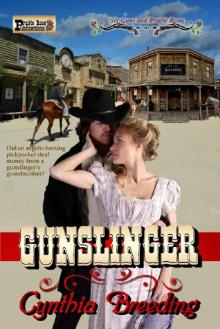 Gunslinger: A Six Guns and Prairie Roses Novel
Gunslinger: A Six Guns and Prairie Roses Novel Rogue of the Borders
Rogue of the Borders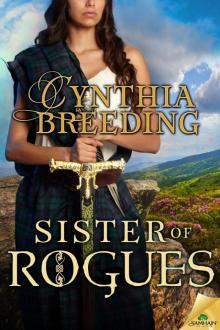 Sister of Rogues
Sister of Rogues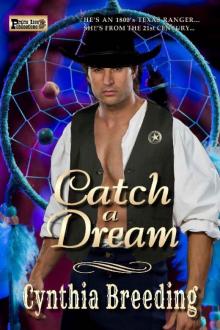 Catch a Dream
Catch a Dream The Immortals II: Michael
The Immortals II: Michael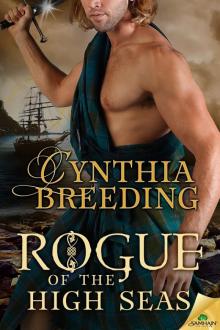 Rogue of the High Seas
Rogue of the High Seas A Rake's Redemption
A Rake's Redemption My Noble Knight
My Noble Knight Rogue of the Highlands: Rogue, Book 1
Rogue of the Highlands: Rogue, Book 1 Rogue of the Isles
Rogue of the Isles The Immortals I_Lucas
The Immortals I_Lucas A Season for Love
A Season for Love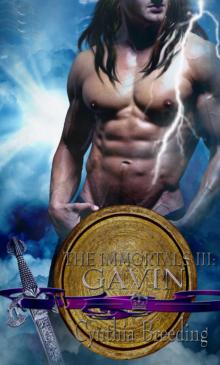 The Immortals III: Gavin
The Immortals III: Gavin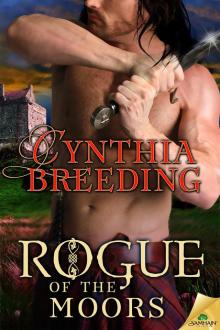 Rogue of the Moors
Rogue of the Moors